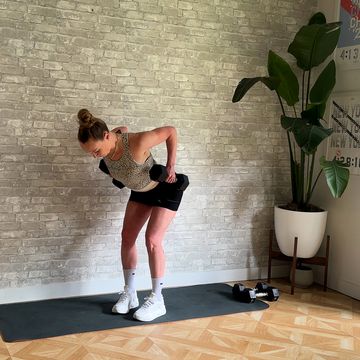Tomorrow’s the big day. Maybe it’s your first race of the season, or your first century. Whatever the case, you’ve done the hard work, and now it’s time to sleep before the big event. Except… how can you possibly sleep when you’re so full of nervous excitement?
Pre-event jitters are common for athletes of all levels and disciplines, says Brendan Duffy, a registered sleep technologist and sleep coach. And while one night’s bad sleep isn’t going to undo months of hard work (and better nights of sleep), there are things you can do to help your brain and body properly wind down.
RELATED: 6 Reasons You're Still Tired After a Full Night's Sleep
Don't Change Your Sleep Habits the Night Before
One of your first instincts before a “big day” may be to hit the hay early. Don’t bother, says Dr. William Christopher Winter, author of upcoming book The Sleep Solution.
“The one thing you don’t want to do is deviate from your typical schedule and try to get extra sleep before your big race. Get your sleep in order now, and work the kinks out. That’s the schedule you want to keep the night before,” he says.
So, if you’ll need to rise unusually early that day, you’ll want to start shifting your routine in the days and weeks beforehand.
RELATED: Tips for Becoming a Morning Person
Keep your room dark (that means put your phone away!)
Give yourself a real shot at sound sleep by eliminating all blue light—or any light, for that matter.
Darkening your room after dinner can help set the stage for the night’s sleep ahead. Professional cyclist Brie Walle with TIBCO-Silicon Valley Bank recommends unplugging from technology at least 90 minutes before bedtime; Duffy even recommends keeping your phone in another room.
If you’re in a hotel, use a wakeup call from the front desk as your alarm. And instead of watching TV from that hotel bed, read a book or print magazine. (Pro tip: Bring a couple of chip clips so you can seal hotel room curtains together and knock out that little sliver of light that always manages to shine in.)
Stretching can be a great way to calm your mind and body before sleep. Try these four essential stretches for cyclists:
Jet lagged? Try a melatonin supplement.
When your bike adventures take you across the country (or across the globe), jet lag may strike: If you’ve just jumped time zones, your body’s internal clock may be at odds with the alarm clock.
To combat this, you can try taking melatonin. Melatonin is a hormone that regulates sleep and wakefulness, and is naturally produced at night (which is why keeping your room dark is such a good idea). Try taking a melatonin supplement about an hour before you’d like to fall asleep.
Duffy alternatively suggests drinking 1 ounce of tart cherry juice, a natural source of melatonin, twice a day to help improve sleep quality and duration.
RELATED: 9 Foods That Help You Sleep
Make a to-do list.
You know the thoughts—“I need to remember to check my tire pressure!” “What if I forget my rain jacket?”
When worries like these race through your head and keep you awake, just take a moment, sit up, and write them down. It may seem counterproductive, but Virginia Tech’s Schiffert Health Center suggests that when your mind is going 100 mph, the act of writing out all those thoughts as a to-do list can be stress-relieving, and help you fall asleep better once you’re done.
Pro cyclist Walle keeps a notebook handy on her bedside table, too.
RELATED: This Is Your Body on Sleep—Or Not Enough of It
End your thoughts on a positive note.
Many athletes practice meditation—and visualization of a course, if they're preparing for a race—as part of their bedtime routine, and this time is especially helpful for training your brain to combat negative thoughts.
When worries pop up during your meditation, Duffy recommends going one by one through these negative images, and balancing each one with a positive. Afraid your wheel will slip out in a corner? Visualize nailing that corner perfectly, then move on.
Instead of worrying about things outside of your control, focus on what you do have in control: Your preparation ahead of the event, your equipment choices, the lines you take, whose wheel you follow.
RELATED: How to Prepare for Your First Big Ride
Get extra sleep in the weeks ahead of your event.
Like building up your training or tapering ahead of a race, you can also bolster your day-of performance by upping your sleep ahead of your event. In a study of Stanford swimmers, increasing sleep to 10 hours per night significantly improved athletes’ performance and reaction times over a six- to seven-week period.
If you’re able to increase your sleep ahead of your event, it should help offset some of the effects of poor sleep the night before the race.
Don’t stress.
Finally, Winter reminds athletes that tonight’s sleep is irrelevant—as long as you’ve been sleeping well leading up to your event.
Just lying there resting you will reap about 70 percent of the benefits you would get from sleeping.
“It’s reasonable to be excited and jacked up,” Winter says. He tells his athletes: “Your job is not to sleep. It’s to make sure you’re in bed at this time, in a quiet, dark, cool environment, and to visualize being successful tomorrow.” That, we can do.
RELATED: Want to Ride Faster? Break These Mental Habits.













